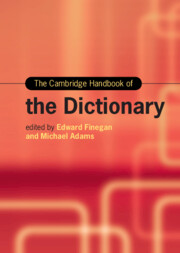Book contents
- The Cambridge Handbook of the Dictionary
- Cambridge Handbooks in Language and Linguistics
- The Cambridge Handbook of the Dictionary
- Copyright page
- Contents
- Figures
- Tables
- Contributors
- Acknowledgments
- Introduction
- Part I Types of Dictionaries
- Part II Dictionaries as Books
- Part III Dictionaries and Ideology
- Chapter 14 Dictionaries, Language Ideologies, and Language Attitudes
- Chapter 15 Dictionaries and Cultural Politics
- Chapter 16 Usage in Dictionaries and Dictionaries of Usage
- Chapter 17 Dictionaries and Language Contact
- Chapter 18 Dictionaries in Religious History and Biblical Interpretation
- Chapter 19 Attitudes Toward “The Dictionary”
- Part IV Dictionaries and Domains of Use
- Part V The Business of Dictionaries
- Part VI The Future of Dictionaries
- References: Dictionaries
- References: Secondary Works
- Index
Chapter 19 - Attitudes Toward “The Dictionary”
from Part III - Dictionaries and Ideology
Published online by Cambridge University Press: 19 October 2024
- The Cambridge Handbook of the Dictionary
- Cambridge Handbooks in Language and Linguistics
- The Cambridge Handbook of the Dictionary
- Copyright page
- Contents
- Figures
- Tables
- Contributors
- Acknowledgments
- Introduction
- Part I Types of Dictionaries
- Part II Dictionaries as Books
- Part III Dictionaries and Ideology
- Chapter 14 Dictionaries, Language Ideologies, and Language Attitudes
- Chapter 15 Dictionaries and Cultural Politics
- Chapter 16 Usage in Dictionaries and Dictionaries of Usage
- Chapter 17 Dictionaries and Language Contact
- Chapter 18 Dictionaries in Religious History and Biblical Interpretation
- Chapter 19 Attitudes Toward “The Dictionary”
- Part IV Dictionaries and Domains of Use
- Part V The Business of Dictionaries
- Part VI The Future of Dictionaries
- References: Dictionaries
- References: Secondary Works
- Index
Summary
Documents attitudes of makers and users toward dictionaries and analyzes attitudes of makers and users and the sometime tension between what users expect and makers provide. Dictionaries evoke strong feelings – often of respect, even reverence, sometimes of disrespect and outrage; they play an outsized role in people’s lives because of the profoundly intimate link between a lexicon and the culture and values of the society whose lexicon it is. A dictionary is viewed by speakers of the enregistered language as a mirror reflecting their culture, and by outsiders as a window into the culture. Creation of a dictionary is itself a kind of enactment – viewed, especially by speakers whose language has not been regarded as real or equal, as recognizing their language. A few nations have instituted academies to patrol their language, in part by crafting dictionaries. Dictionary makers’ attitudes are expressed in the frontmatter and, more reliably, in the entries and contents. In recent decades, users have addressed makers directly, insisting that dictionaries speak not only to their lexical needs but that they accurately mirror their social, political, and ethical values.
Keywords
- Type
- Chapter
- Information
- The Cambridge Handbook of the Dictionary , pp. 385 - 406Publisher: Cambridge University PressPrint publication year: 2024

